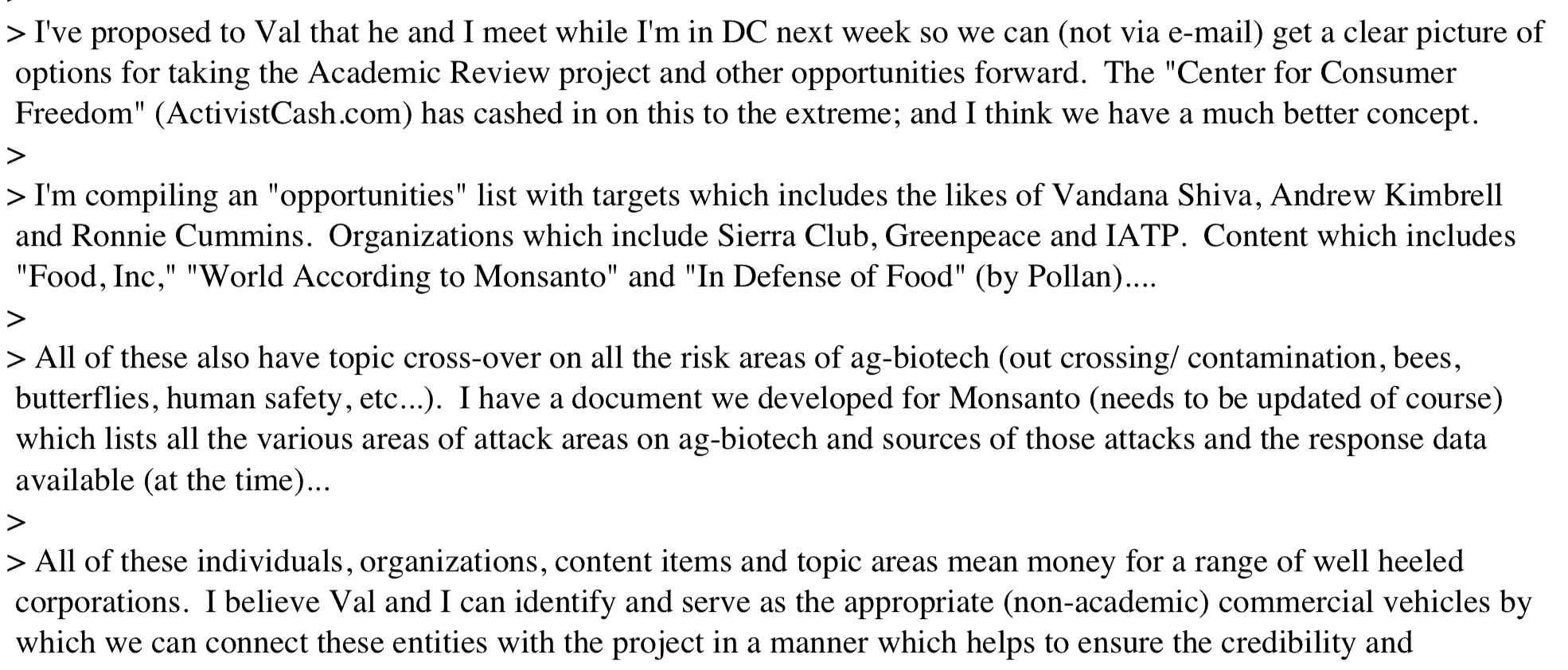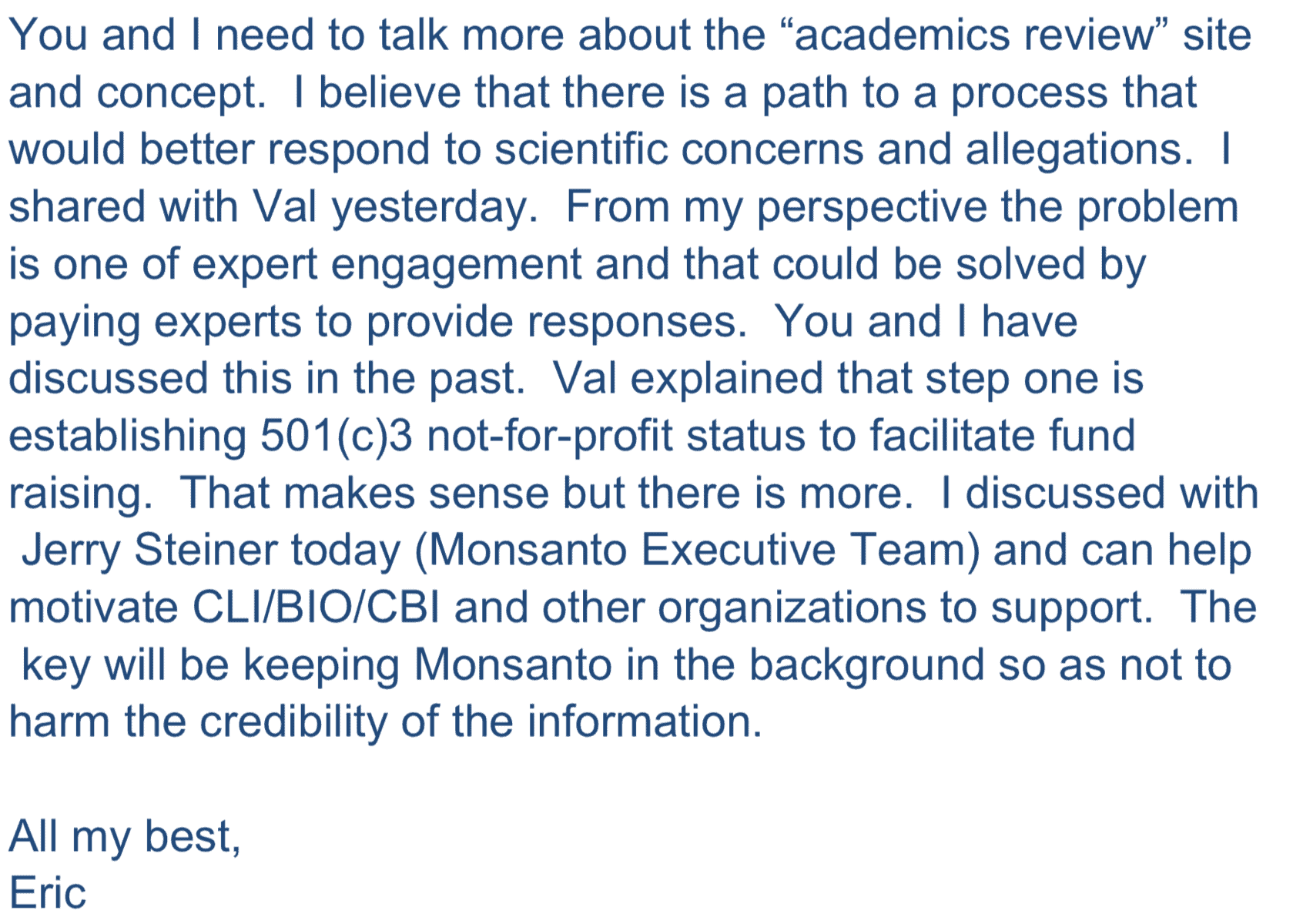Val Giddings, PhD, is a key player in agrichemical industry efforts to oppose transparency and safety regulations for genetically engineered foods and pesticides. Emails obtained by U.S. Right to Know and posted in the UCSF Chemical Industry Documents Library indicate that Dr. Giddings helped set up a corporate front group and played a key behind-the-scenes role in other activities to push the deregulatory agenda of the world’s largest agrichemical companies.
Dr. Giddings is a former vice president at the Biotechnology Industry Organization (BIO), a trade group for agrichemical and biotechnology companies. He now runs the consulting firm PrometheusAB, and is a senior fellow at theInformation Technology and Innovation Foundation (ITIF).
ITIF is a think tank funded by the pharmaceutical, wireless, telecom, film and biotech industries, best known for opposing “net neutrality” and promoting the agenda of the tech industry. The group moved into biotechnology in 2011 with Dr. Giddings. Members of Congress who serve as “honorary co-chairs” of ITIF, including U.S. Reps Anna Eshoo (D-CA), Darrell Issa (R-CA) and Senators Orrin Hatch (R-UT) and Chris Coons (D-DE), appear to be endorsing and assisting the tobacco tactics that Dr. Giddings has used to advance agrichemical industry interests.
Cooked up academic front group to discredit Monsanto critics
Emails obtained by U.S. Right to Know indicate that Dr. Giddings played a central role in setting up Academics Review as a front group that falsely claimed to be independent while taking agrichemical industry funds and trying to keep corporate fingerprints hidden.
Other key planners wereJay Byrne, a former director of corporate communications at Monsanto; Bruce Chassy, PhD, professor emeritus at the University of Illinois at Urbana-Champaign; andEric Sachs, PhD, director of regulatory policy and scientific affairs at Monsanto.
Academics Review falsely claims on its website that it does not accept corporate money or solicit donations for specific activities; but according to tax forms, most of the funding for Academics Review came from the Council for Biotechnology Information, a trade group funded and run by the world’s largest chemical companies: BASF, Bayer/Monsanto, DowDuPont and Syngenta/ChemChina.
Timeline of key events for Academics Review:
March 11, 2010:Byrne and Dr. Chassy discussed setting up Academics Review as a front group to target critics of GMOs and pesticides with help from Dr. Giddings. Byrne said he and Dr. Giddings could serve as “commercial vehicles” to connect corporate entities to the project “in a manner which helps ensure the credibility and independence (and thus value) of the primary contributors/ owners…”Byrne noted he was developing for Monsanto a list of agrichemical industry critics to target:

March 24, 2010: Dr. Chassy launched the Academics Review website along with David Tribe, PhD, senior lecturer at the University of Melbourne, Australia, with both men listed as cofounders.
November 23, 2010:Dr. Giddings and Dr. Chassy discussed which companies and industry groups might “pony up” for Academics Review to refute a paper that criticized genetically engineered soy.
- “I bet we could generate some respectable support for it,” Dr. Giddings wrote to Dr. Chassy.
- Chassy responded in part, “I bet our friends at Monsanto would be willing to write the rebuttal and pay us to post it.”
- Giddings wrote, “I think the soybean guys might be willing to pony up a chunk to underwrite a rebuttal … If we do this right we can leverage the AcaRev Brand here a bit.”
A week later, Dr. Chassy asked Eric Sachs if Monsanto planned to refute the soy paper, and told Sachs: “The US Soybean Board is going to entertain a proposal from me and Graham Brookes to respond to the piece.” (Academics Review posted a response from Chassy and Brookes in 2012 with no disclosure about funders.)
November 30, 2010: In the email exchange with Dr. Chassy, Eric Sachs of Monsanto saidhe could help motivate the pesticide and GMO industry trade groups to support Academics Review.“The key will be keeping Monsanto in the background so as not to harm the credibility of the information,” Sachs wrote.

August 2011:Dr. Giddings submitted a proposal to the agrichemical industry-funded trade group CBI for the project: “what we do over the next year is directly a function of the support we can raise,” he wrote to CBI Managing Director Ariel Gruswich, in an email copied to Drs. Chassy and Tribe. Gruswich urged the men to join a phone call with her group: “I really believe that hearing directly from you all will increase the likelihood of support among the companies,” she wrote.Tax records show the corporate-funded CBI gave Academics Review $650,000 from 2014 to 2016 for “scientific outreach.”
April 2014:Academics Review published a report attacking the organic industry as a marketing scam, and claimed to be an independent group with no conflicts of interest. See: “Monsanto fingerprints found all over attack on organic food,” by Stacy Malkan, Huffington Post
Industry-funded “boot camps” trained scientists, journalists how to spin GMOs and pesticides
Over $300,000 of the chemical industry funds Dr. Giddings helped raise for Academics Review went to pay for two conferences called the “Biotech Literacy Project” boot camps, held at the University of Florida in 2014 and UC Davis in 2015, according to tax records.The boot camps – organized by Academics Review and another industry front group, Genetic Literacy Project – trained journalists and scientists how to reframe the debate about GMOs and pesticides.
See: “Flacking for GMOs: How the Biotech Industry Cultivates Positive Media – and Discourages Criticism,” by Paul Thacker, The Progressive
Deregulating GMOs: “blow the whole damn thing up”
In emails dated February 2015, Dr. Giddings discussed with several academics a plan to write five journal papers arguing for the need to deregulate the biotech industry. Dr. Giddings wrote that the papers should capture, “what I call Henry’s ‘Blow the whole damn thing up’ argument, which is a case I do think should be made.” University of Arizona law professor Gary Marchant, who initiated the email exchange, explained, “paper 1 is intended to be the blow the whole damn thing up topic.”
Alan McHughen, a public sector educator at UC Riverside and “ambassador expert” for the agrichemical industry-funded marketing campaign GMO Answers, offered to write paper 1. Henry Miller, MD, said he could help but had too much on his plate to be primary author. (A month later, Miller posted an article in Forbesthat the New York Timeslater revealed had been ghostwritten by Monsanto.)
Others copied on the email about the journal papers were Drew Kershen of the University of Oklahoma College of Law; Guy Cardineau, Yvonne Stevens and Lauren Burkhart of Arizona State University; Steven Strauss of Oregon State University; Kevin Folta of University of Florida; Shane Morris of Natural Resources Canada ; Alison Van Eenennaam of UC Davis; Joanna Sax of the California Western School of Law; and Thomas Reddick of the Global Environmental Ethics Council.
Coordinated scientist sign-on letter against Seralini study
In September 2012, Dr. Giddings coordinated a scientist sign-on letter urging Wallace Hayes, editor-in-chief of Food and Chemical Toxicology, to reconsider a September 2012 paper by the French researcher Gilles-Éric Séralini that reported tumors in rats fed a diet of Roundup-tolerant GM corn. The paper was retracted a year later and later republished in another journal.
To help coordinate the sign on letter, Dr. Giddings used AgBioChatter – a private liserverthat pro-industry academics, senior agrichemical industry staffers and their PR operatives used to coordinate messaging and lobbying activities. One professor who signed the letter, Chris Leaver, noted that he had “been doing behind the scenes briefing via Sense About Science” about the Séralini study. Sense About Science has a long history of spinning science for the benefit of corporate interests.
Signers of the letter to Food and Chemical Toxicologywere Robert Wager, Alda Lerayer, Nina Fedoroff, Giddings, Steve Strauss, Chris Leaver, Shanthu Shantharam, Ingo Potrykus, Marc Fellous, Moises Burachik, Klaus-Dieter Jany, Anthony Trewavas, C Kameswara Rao, C.S. Prakash, Henry Miller, Kent Bradford, Selim Cetiner, Alan McHughen, Luis De Stefano-Beltrán, Bruce Chassy, Salbah Al-Momin, Martina Newell-McGloughlin, Klaus Ammann, Ronald Herring, Lucia de Souza.
Related: “Unearthed emails: Monsanto connected to campaign to retract GMO paper,” Retraction Watch
Suggested attractive “mommy farmers” should pitch GMOs
In conversations with a Monsanto lobbyist about how to defeat GMO labeling campaigns in Colorado and Oregon in 2014, Dr. Giddings suggested that good-looking “mommy farmers” would be the best messengers to allay concerns about genetically engineered foods.“What the situation requires is a suite of TV spots featuring attractive young women, preferably mommy farmers, explaining why biotech derived foods are the safest & greenest in the history of ag and worthy of support,” Dr. Giddings wrote to Lisa Drake, Monsanto’s lead for government affairs.
In a September 2015 front-page New York Times story, three-time Pulitzer Prize winner Eric Lipton described the emails:
“In this extended email exchange, some of the scientists and academics who have been recruited to help Monsanto push its cause question whether they are the best messengers. Two suggest that Monsanto run more television ads featuring farmers instead. The Monsanto lobbyist replies that polling shows that the public believes scientists. In fact, the company has already run TV ads featuring female farmers.”
See: “Food industry enlisted academics in GMO labeling war, emails show,” by Eric Lipton, New York Times.









